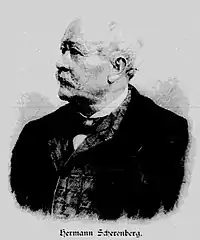Hermann Scherenberg
Hermann Scherenberg (20 January 1826, Swinemünde - 21 August 1897, Berlin) was a German painter, illustrator and caricaturist.

Biography
According to Theodor Fontane, who knew the Scherenbergs and wrote about them in his autobiography,[1] the family originally came from Westphalia and his father, Johann Friedrich Scherenberg, lived in the Huguenot colony in Swinemünde. Hermann was born to Johann's second wife. His older half-brother was the poet, Christian Friedrich Scherenberg. He was also related to the poet and journalist, Ernst Scherenberg.
From 1846 to 1847, he studied painting at the Kunstakademie Düsseldorf, under the tutelage of Theodor Hildebrandt.[2]
For many years, he was an employee of the Illustrirte Zeitung, providing hundreds of illustrations. He drew portraits of prominent personalities and major events from Prussian and German history as well as scenes from everyday life.
He had one son, Hans, who apparently also became a painter, although no further information is available.
He was interred at the Luisenstädtischer Friedhof in Berlin. The gravesite has not been preserved.[3]
Selected works
.jpg.webp) The Great Elector Landing on Rügen
The Great Elector Landing on Rügen.JPG.webp) Benefit Bazaar at the Berlin Palace
Benefit Bazaar at the Berlin Palace.jpg.webp) A Soup Kitchen in Berlin (1868)
A Soup Kitchen in Berlin (1868).jpg.webp) Return of the Victorious Army (1871)
Return of the Victorious Army (1871)
References
- Theodor Fontane: Meine Kinderjahre. Autobiographischer Roman. 4th Ed. Berlin 1903. pps. 112–116.
- Museum Kunstpalast: Künstler und Künstlerinnen der Düsseldorfer Malerschule (PDF)
- Hans-Jürgen Mende: Lexikon Berliner Grabstätten. Haude & Spener, Berlin 2006. pg.83.
External links
- Deutsche Bilderbogen
- Three Anti-clerical caricatures from Ulk
- Hermann Scherenberg in HeidICON, Illustrations from the Fliegende Blätter